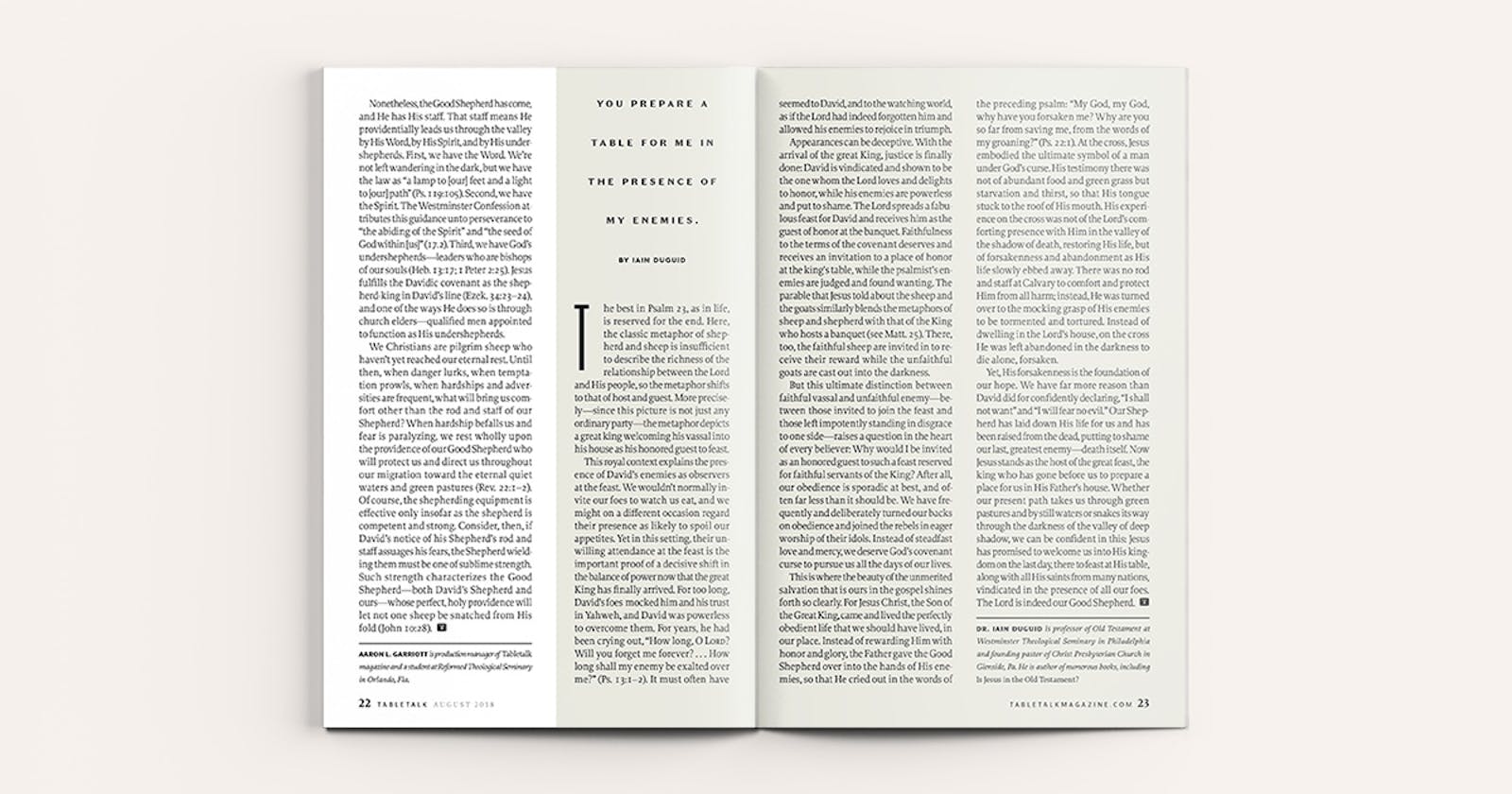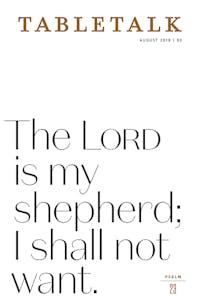
Request your free, three-month trial to Tabletalk magazine. You’ll receive the print issue monthly and gain immediate digital access to decades of archives. This trial is risk-free. No credit card required.
Try Tabletalk NowAlready receive Tabletalk magazine every month?
Verify your email address to gain unlimited access.
The best in Psalm 23, as in life, is reserved for the end. Here, the classic metaphor of shepherd and sheep is insufficient to describe the richness of the relationship between the Lord and His people, so the metaphor shifts to that of host and guest. More precisely—since this picture is not just any ordinary party—the metaphor depicts a great king welcoming his vassal into his house as his honored guest to feast.
This royal context explains the presence of David’s enemies as observers at the feast. We wouldn’t normally invite our foes to watch us eat, and we might on a different occasion regard their presence as likely to spoil our appetites. Yet in this setting, their unwilling attendance at the feast is the important proof of a decisive shift in the balance of power now that the great King has finally arrived. For too long, David’s foes mocked him and his trust in Yahweh, and David was powerless to overcome them. For years, he had been crying out, “How long, O Lord? Will you forget me forever? . . . How long shall my enemy be exalted over me?” (Ps. 13:1–2). It must often have seemed to David, and to the watching world, as if the Lord had indeed forgotten him and allowed his enemies to rejoice in triumph.
Appearances can be deceptive. With the arrival of the great King, justice is finally done: David is vindicated and shown to be the one whom the Lord loves and delights to honor, while his enemies are powerless and put to shame. The Lord spreads a fabulous feast for David and receives him as the guest of honor at the banquet. Faithfulness to the terms of the covenant deserves and receives an invitation to a place of honor at the king’s table, while the psalmist’s enemies are judged and found wanting. The parable that Jesus told about the sheep and the goats similarly blends the metaphors of sheep and shepherd with that of the King who hosts a banquet (see Matt. 25). There, too, the faithful sheep are invited in to receive their reward while the unfaithful goats are cast out into the darkness.
But this ultimate distinction between faithful vassal and unfaithful enemy—between those invited to join the feast and those left impotently standing in disgrace to one side—raises a question in the heart of every believer: Why would I be invited as an honored guest to such a feast reserved for faithful servants of the King? After all, our obedience is sporadic at best, and often far less than it should be. We have frequently and deliberately turned our backs on obedience and joined the rebels in eager worship of their idols. Instead of steadfast love and mercy, we deserve God’s covenant curse to pursue us all the days of our lives.

This is where the beauty of the unmerited salvation that is ours in the gospel shines forth so clearly. For Jesus Christ, the Son of the Great King, came and lived the perfectly obedient life that we should have lived, in our place. Instead of rewarding Him with honor and glory, the Father gave the Good Shepherd over into the hands of His enemies, so that He cried out in the words of the preceding psalm: “My God, my God, why have you forsaken me? Why are you so far from saving me, from the words of my groaning?” (Ps. 22:1). At the cross, Jesus embodied the ultimate symbol of a man under God’s curse. His testimony there was not of abundant food and green grass but starvation and thirst, so that His tongue stuck to the roof of His mouth. His experience on the cross was not of the Lord’s comforting presence with Him in the valley of the shadow of death, restoring His life, but of forsakenness and abandonment as His life slowly ebbed away. There was no rod and staff at Calvary to comfort and protect Him from all harm; instead, He was turned over to the mocking grasp of His enemies to be tormented and tortured. Instead of dwelling in the Lord’s house, on the cross He was left abandoned in the darkness to die alone, forsaken.
Yet, His forsakenness is the foundation of our hope. We have far more reason than David did for confidently declaring, “I shall not want” and “I will fear no evil.” Our Shepherd has laid down His life for us and has been raised from the dead, putting to shame our last, greatest enemy—death itself. Now Jesus stands as the host of the great feast, the king who has gone before us to prepare a place for us in His Father’s house. Whether our present path takes us through green pastures and by still waters or snakes its way through the darkness of the valley of deep shadow, we can be confident in this: Jesus has promised to welcome us into His kingdom on the last day, there to feast at His table, along with all His saints from many nations, vindicated in the presence of all our foes. The Lord is indeed our Good Shepherd.
